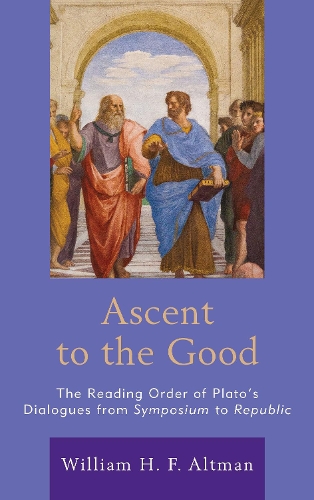
Ascent to the Good: The Reading Order of Platos Dialogues from Symposium to Republic
(Hardback)
Publishing Details
Ascent to the Good: The Reading Order of Platos Dialogues from Symposium to Republic
By (Author) William H. F. Altman
Bloomsbury Publishing PLC
Lexington Books
29th November 2018
United States
Classifications
Professional and Scholarly
Non Fiction
Literary studies: ancient, classical and medieval
Philosophy
184
Physical Properties
Hardback
660
Width 159mm, Height 235mm, Spine 51mm
1125g
Description
At the crisis of his Republic, Plato asks us to imagine what could possibly motivate a philosopher to return to the Cave voluntarily for the benefit of others and at the expense of her own personal happiness. This book shows how Plato has prepared us, his students, to recognize that the sun-like Idea of the Good is an infinitely greater object of serious philosophical concern than what is merely good for me, and thus why neither Plato nor his Socrates are eudaemonists, as Aristotle unquestionably was. With the transcendent Idea of Beauty having been made manifest through Socrates and Diotima, the dialogues between Symposium and RepublicLysis, Euthydemus, Laches, Charmides, Gorgias, Theages, Meno, and Cleitophon prepare the reader to make the final leap into Platonism, a soul-stirring idealism that presupposes the students inborn awareness that there is nothing just, noble, or beautiful about maximizing ones own good. While perfectly capable of making the majority of his readers believe that he endorses the harmless claim that it is advantageous to be just and thus that we will always fare well by doing well, Plato trains his best students to recognize the deliberate fallacies and shortcuts that underwrite these claims, and thus to look beyond their own happiness by the time they reach the Allegory of the Cave, the culmination of a carefully prepared Ascent to the Good.
Reviews
William Altmans five-volume project is a breathtakingly ambitious attempt to fit all of Platos thirty-five dialogues into the sequence in which Plato would have wanted them read. Putting Plato as teacher at the heart of the dialogues, Altman structures this reading order by the distinctions between preparatory, visionary, and testing texts and takes the allegory of the cave as its center. He offers nothing less than a fundamental alternative to the developmentalism that has dominated Platonic scholarship for the past century. In Ascent to the Good, the second of the five volumes, Altman offers detailed readings of Lysis, Euthydemus, Laches, Charmides, Gorgias, Theages, Meno, and Cleitophon, treating them as steps toward the vision of the Good in the Republic hence the title. Its core insight, itself worth the price of the whole, is that by Socrates cultivation of eudaimonism in these eight dialogues, Plato aims to prepare the best of his readers for the overcoming of it in the recognition, occasioned by Republic 6-7, that the Good and Justice require them to sacrifice their happiness to serve their fellow citizens. In its close reading, its interpretive depth, and its dialectical engagement with every major current of Platonic scholarship, Ascent to the Good is a thought-provoking tour de force. -- Mitchell Miller, Vassar College
William Altman's Ascent To The Good, together with its companion volumes, belongs itself, for sure, to the class of achievement for which Altman in these pages proposes the dialogues of Plato as the paradigmatic case. Altman's book is one installment in an extensive body of work that has in its own good time matured within the mind of an intellectual who is also a first-rate teacher, before finally being delivered to the public in writing in a series that, whatever the completeness of its separate items, is designed for eventual understanding as a whole. So too, according to Altman, with the dialogues of Plato. Our understanding of those dialogues was intended by Plato to be the result of our having read each item within the series in a specific order; this would be how Plato the writer succeeds also in being Plato the pedagogue. Altman's bold argument commands respect for its scholarly competence; but it invites outright admiration for its breathtaking reach and, not least, its depth of feeling. -- John Ferrari, University of California, Berkeley
Ascent to the Good lays the groundwork for Altmans monumental multivolume study of Platos ethics. He reads a series of dialogues as aimed at implicitly showing the limits to Socratic eudaimonism, both as a philosophy to be thought and as a philosophy to be lived. He shows how they point to an ethics if reverence developed in the arguments of the Republic according to which our good is found not in our own good, but in the Beauty that transcends us. Altman balances his close attention to the details of the drama and argument of the dialogue with a passionate concern for the big picture. His interpretations of Lysis, Gorgias, Protagoras and related dialogues, are startlingly original, and are not easily dismissed. The patient reader, convinced or no, will have her approach to the Platonic dialogues transformed by Altmans new questions and insights. -- Owen Goldin, Marquette University
Author Bio
William H. F. Altman, having been persuaded by Platos Republic that Justice requires the philosopher to go back down into the Cave, has devoted his professional life to the cause of public education. Since retiring in 2013, he has been working as an independent scholar on the continuation of Plato the Teacher (2012).
